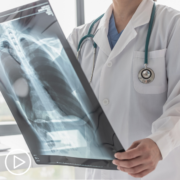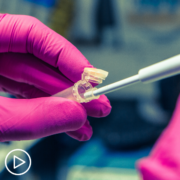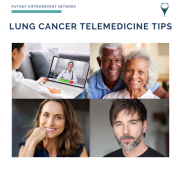Small Cell Lung Cancer | Hope for Treatment Advancements
Small Cell Lung Cancer | Hope for Treatment Advancements from Patient Empowerment Network on Vimeo.
What does the future of small cell lung cancer (SCLC) treatment look like? Dr. Rafael Santana-Davila with the University of Washington School of Medicine explains advances in SCLC research, treatments that are in clinical trials, and questions to ask about clinical trial access.
[ACT]IVATION TIP
…you need to ask the doctors, “Are there any clinical trials that you’re excited about that I should look into right now? Where are they available? And can I participate in that?”
See More from [ACT]IVATED Small Cell Lung Cancer (SCLC)
Related Resources:

|

|

Advice for Small Cell Lung Cancer Patients Considering Clinical Trials |
Transcript:
Lisa Hatfield:
Often, SCLC patients feel like there’s so much information coming out about non-small cell lung cancer, but feel left out of these conversations. Can you share why small cell lung cancer patients should be hopeful for more conversations around advancements in the future?
Dr. Rafael Santana-Davila:
So that is a very important question, subject. And that is true. We see a lot of advances in non-small cell lung cancer and not that much in small cell lung cancer. I frequently say that small cell lung cancer is the bad brother, the black sheep that we don’t talk about. Part of that is because small cell lung cancer is just a more aggressive cancer, but part of that is it has not been studied as much as non-small cell. Non-small cell lung cancer is also a hodgepodge of diseases, and there are a variety of diseases that are nested into that category, so it’s natural to have more advances in that because there are more diseases. But I can tell patients that we’re making headways in small cell lung cancer.
We’re making headways in identifying those patients that we need to escalate therapy, we’re identifying novel treatments. There are different things in the pipeline that range from other methods of immuno-oncology, like complicated names like BiTE therapies or antibody drug conjugates that are coming out. There are a lot of epigenetic therapies that are coming out. So although it’s true that patients with non-small cell lung cancer have had more advances, there is still a lot of hope for the future. And what I can tell you it’s changing rapidly. And in a year, the treatments that we may have available will be different. And all those things are right now going into clinical trials. So that’s why the activation tip for that is you need to ask the doctors, “Are there any clinical trials that you’re excited about that I should look into right now? Where are they available? And can I participate in that?”
Share Your Feedback:
Create your own user feedback survey










